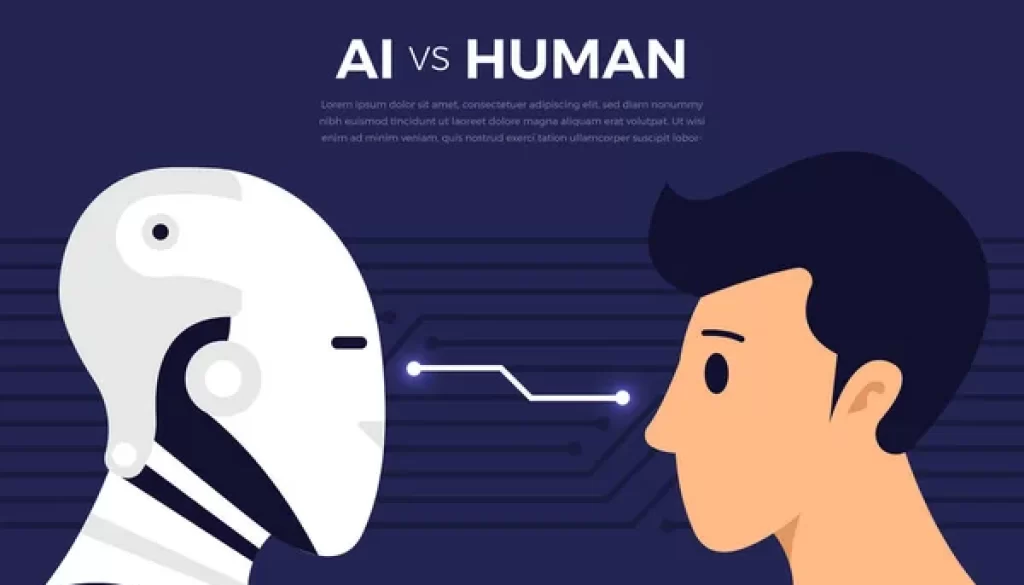Artificial Intelligence vs Human Intelligence: Unraveling the Advancements
In this era of digital metamorphosis, the rapid evolution of technology begets a captivating juxtaposition between artificial cognition and human cognition. As we embark on the intricacies of these two distinctive domains, it becomes imperative to fathom their ramifications, capabilities, and constraints. In this comprehensive discourse, we delve into the dynamic interplay between artificial cognition and human cognition, casting a luminous aura upon their distinct virtues and demerits. Lets start the journey of Artificial Intelligence vs Human.
The Rise of Artificial Intelligence

Artificial intelligence (AI), an epitome of technological history, represents a pivotal milestone. It entails the evolution of machines and algorithms engineered to simulate human cognition and execute tasks that typically necessitate human mental faculties. AC systems can ingest copious datasets, discern patterns, and render decisions, rendering them indispensable in diverse sectors.
AI in Data Processing
The revolution wrought by artificial cognition in data processing is nothing short of astonishing. AC systems adroitly process voluminous datasets with precision, unearthing meaningful insights and discerning trends. This capability proves invaluable in sectors such as finance, healthcare, and marketing, where data-driven decisions underpin triumph.
Within the realm of finance, AI algorithms scrutinize stock market data and execute real-time trading determinations, surpassing human traders in swiftness and precision. Similarly, in healthcare, AI-fueled diagnostic tools expeditiously scrutinize medical imagery, enhancing the accuracy and timeliness of diagnoses.
Automation and Efficiency
One of AC’s paramount advantages lies in its automation prowess. Automation not only heightens efficiency but also curtails the margin of error. Enterprises are increasingly embracing AC to streamline their operations, yielding substantial cost economies and augmented productivity.
In the sphere of manufacturing, robots endowed with AC competencies adeptly undertake repetitive tasks with exactitude, thereby diminishing the dependence on human labor. This not only elevates product quality but also empowers human workers to focus on the more intricate, imaginative, and predicament-solvings facets of their vocations.
Predictive Analytics
The prognostic potential of AC is nothing short of remarkable. By dissecting historical data and unraveling patterns, AC systems have the aptitude to foreshadow future trends and occurrences, bolstering decision-making and tactical development. This proves particularly invaluable in industries such as e-commerce and finance, where pre-empting trends constitutes a linchpin of prosperity.
In the realm of e-commerce, AI-driven recommendation systems disentangle user behavior to proffer product suggestions, thereby amplifying the user experience and augmenting sales. In finance, AI augments the ability to prophesy market trends, thereby aiding investors in well-informed decisions and the mitigation of risks.

Natural Language Processing
AC has made colossal strides in linguistic cognition. Linguistic cognition algorithms can decipher and generate human discourse, proffering novel prospects for chatbots, virtual aides, and linguistic translation amenities. Linguistic cognition metamorphoses customer support, rendering it more resourceful and accessible.
The Limitations of Artificial Intelligence
While AC augurs immense promise, it is not without its idiosyncratic constraints.
Lack of Emotional Intelligence
One of the most conspicuous disparities between AC and humans resides in emotional cognition. AC is devoid of the capacity to fathom or express emotions, engendering complexities in various sectors such as customer service, psychotherapy, or artistic creation, wherein human empathy is indispensable.
In customer service, for instance, AC chatbots can efficaciously field routine inquiries. Nevertheless, when confronted with convoluted or emotionally laden predicaments, human intervention invariably becomes indispensable. Similarly, in psychotherapy and counseling, human therapists are irreplaceable, for they can empathize with and grasp the emotional subtleties of their clients.
Ethical and Privacy Concerns
The proliferation of AC engenders ethical and privacy concerns. Stringent regulation becomes obligatory to preserve data privacy and uphold ethical contemplations, given that AC systems can be wielded for nefarious objectives. Issues such as partiality in AC algorithms, surveillance, and data safeguarding necessitate redressal.
Recommendation systems driven by AC, for instance, have faced censure for reinforcing partialities inherent in historical data. Correcting these biases is imperative to warrant impartiality and equity in AC applications. Furthermore, the utilization of AC in surveillance has spawned trepidations concerning privacy and surveillance overextension.
Creativity and Innovation
AC can emulate human inventiveness to a certain extent but remains incapable of supplanting innate human ingenuity for crafting genuinely novel content. Disciplines like art, music, and literature still pivot extensively on human inventiveness. AC-concocted art and music may be intriguing, yet they lack the profoundness of human expression and sentiment.
In the arena of art, celebrated artists conjure timeless masterpieces that kindle profound emotions in their audience. These imaginative enterprises are deeply rooted in human experiences, rendering them beyond AC’s reach. Likewise, literature thrives on human authors’ singular perspectives, storytelling, and imagination.
Limited Adaptability
AC operates within pre-established constraints and data. It lacks the inherent versatility and adaptability of the human intellect. In situations marked by dynamism and unpredictability, human cognition excels in rapid learning and adaptation to novel challenges.
In emergency response situations, for example, first responders bank on their human judgment and adaptability to contend with unforeseen contingencies. While AC can facilitate decision-making, it fails to match the on-the-fly adaptability of human responders navigating intricate, swiftly evolving scenarios.
The Unmatched Power of Human Intelligence
Human cognition remains an unmatched force in the universe. It serves as the fount of innovation, inventiveness, and emotional acumen.

Creativity and Artistry
Domains like art, literature, and music stand as showcases of human inventiveness. The capacity to craft, conceive, and innovate is an intrinsic facet of human cognition, enriching the cultural tapestry of our world. Human artists and wordsmiths infuse their creations with personal experiences, emotions, and distinctive viewpoints.
In the realm of art, human artists beget timeless masterpieces that resonate with their thoughts, sentiments, and experiences. Works such as Leonardo da Vinci’s “Mona Lisa” and Beethoven’s Symphony No. 9 are lauded for their profound emotional resonance, testifying to the profundity of human inventiveness.
Emotional Intelligence
Humans harbor an innate emotional intelligence that facilitates their comprehension, empathy, and intercommunication on a profound plane. This attribute assumes an irreplaceable role in fields such as psychotherapy, education, and interpersonal bonds.
In the realm of psychotherapy and counseling, human therapists leverage their emotional intelligence to connect with clients, helping them navigate intricate emotions and ordeals. In education, educators fathom the unique requisites of their pupils and adapt their pedagogical strategies accordingly, fostering superior learning experiences.
Adaptability
Human cognition is hallmarked by its astonishing adaptability. Humans swiftly grasp and adapt to new situations and challenges, a trait particularly vital in fluid occupational milieus and industries. This adaptability stems from the multifaceted human brain’s ability to cognize, scrutinize critically, and surmount problems.
In the swiftly evolving sphere of technology, human engineers and pioneers continually acclimate to emerging trends and challenges. They blaze trails in developing cutting-edge solutions and driving advancement. Human adaptability constitutes an asset that no AC can completely replicate.
Moral and Ethical Judgment
Human cognition encompasses moral and ethical discernment, empowering individuals to render judgments predicated on values, empathy, and communal considerations. This facet of human cognition assumes critical importance in the realms of law, governance, and various communal contexts.
In the judicial sphere, adjudicators and attorneys make determinations impacting individuals and communities. These determinations frequently mandate a grasp of the broader communal repercussions and ethical considerations. While AC can lend a hand in legal research and document analysis, it is bereft of the capacity for moral ratiocination and ethical discernment.
The Synergy of AI and Human Intelligence
Rather than pitting artificial cognition against human cognition, a more fecund approach is to contemplate their symbiosis.
Collaborative Decision-Making

AC can serve as a precious implement for human decision-makers. It can scrutinize data, detect patterns, and proffer insights, but the definitive determination should remain within the human purview, encompassing ethical and emotional dimensions.
In the legal sphere, for instance, AC systems can expedite lawyers in perusing voluminous legal documents for germane information. This expedites the process and diminishes the likelihood of oversight regarding pivotal minutiae. However, ultimate legal determinations, including case strategy and negotiations, necessitate human judgment and ethical considerations.
Enhancing Productivity
In various industries, AC can collaborate with humans to amplify productivity. In the sphere of healthcare, for instance, AC can assist physicians in diagnosing maladies, thereby mitigating errors and enhancing patient care. AC algorithms can dissect medical imagery, detect anomalies, and yield valuable insights to healthcare professionals.
In the domain of healthcare, AC holds the potential to revolutionize patient care. Diagnostic AC systems can scrutinize medical images, ascertain early signs of maladies, and aid healthcare professionals in rendering more precise diagnoses. This not only elevates the quality of healthcare but also salvages lives.
Exploring New Horizons
The ability of AC to scrutinize prodigious datasets can unlock new avenues for research and revelations in domains such as astrophysics, medicine, and environmental science, wherein the human intellect may encounter limits.
In the realm of astrophysics, AC algorithms can dissect voluminous datasets from telescopes and satellites, assisting astronomers in uncovering fresh celestial phenomena. In environmental science, AC-fueled models can dissect climatic data, prognosticating environmental changes and contributing to conservation endeavors.
Ethical and Social Considerations
The integration of AC into assorted facets of existence necessitates scrupulous scrutiny of ethical and communal consequences.
Data Privacy and Security
The extensive utilization of AC systems engenders voluminous data. The safeguarding of this data from breaches and abuse becomes a momentous preoccupation. Regulations and cybersecurity measures become imperative to preserve personal and confidential information.
Bias and Fairness
AC algorithms can inadvertently perpetuate biases inherent in the data on which they are educated. Rectifying bias in AC systems assumes critical importance to secure impartiality and fairness in arenas such as hiring, lending, and criminal justice.
Employment and Workforce
The mechanization of certain tasks by AC systems begets questions concerning the impact on the labor market. While AC can heighten productivity, it can also precipitate the displacement of the workforce in certain industries.
Accountability and Liability
Determining culpability in instances of AC errors or miscalculations is a complex issue. Establishing frameworks for accountability and liability becomes pivotal to grapple with this challenge.
Regulation and Governance
As AC technologies advance, the imperative for comprehensive regulation and governance becomes progressively weighty. Governments and international bodies must collaborate to articulate ethical standards and guidelines for AC development and deployment.
The Future of AI and Human Intelligence
The future teems with exhilarating possibilities as AC and human cognition persist in coexistence and collaboration.
Advancements in AI
AC will persist in its evolution, marked by increasingly intricate algorithms and applications. Deep learning, neural networks, and quantum computing stand as areas of active investigation, promising even more potent AC systems.
Education and Training
Education and training programs will assume a pivotal role in preparing individuals for a world wherein AC is melded into diverse domains. The cultivation of aptitudes pertaining to AC, data science, and digital literacy will accrue paramount significance.
New Professions and Opportunities
The assimilation of AC will engender fresh vocations and opportunities. Ethical AC designers, AC trainers, and AC ethics advisors will be in demand to guarantee the responsible development and utilization of AC technologies.

Ethical AI Development
As AC increasingly embeds itself in society, ethical considerations will loom large in AC development. Ethical AC development will concentrate on guaranteeing fairness, transparency, and accountability.
Collaboration and Synergy
The harmonious interaction of AC and human cognition will usher in innovative resolutions in diverse fields. From healthcare to education to environmental preservation, the interaction between humans and AC will propel progress and tackle intricate challenges.
Conclusion to Artificial Intelligence vs Human
In the persistent discourse on artificial cognition vs. human cognition, it emerges conspicuously that both harbor distinct virtues and restrictions. AC excels in data processing, mechanization, and prognostic analytics, while human cognition shines in inventiveness, emotional acumen, adaptability, moral judgment, and ethical ratiocination. By acknowledging the strengths of each and nurturing collaboration, we can exploit the full potential of both, heralding a more innovative and harmonious future.
Additional Links
- Artificial Intelligence vs. Human Intelligence: Top 7 Differences
- Artificial Intelligence vs. Human Intelligence | Will AI …



